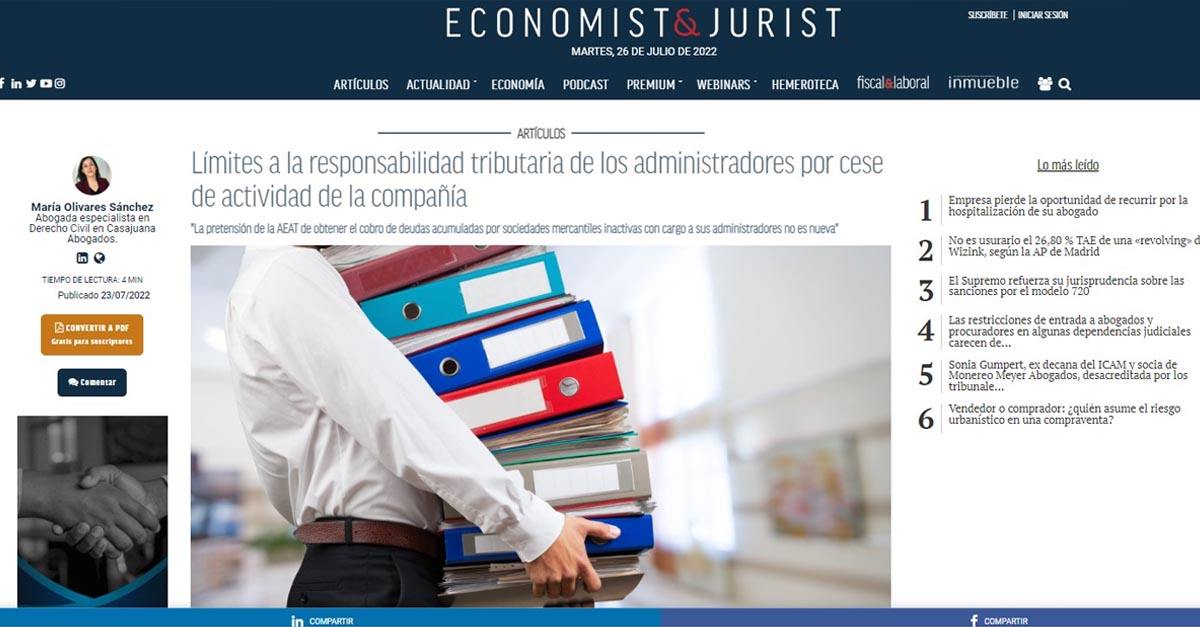Limits to the tax liability of administrators due to cessation of company activity

Article written by María Olivares Sánchez, an expert in Bankruptcy Law and published in the newspaper Economist & Jurist.
The claim of the AEAT to obtain the collection of debts accumulated by inactive mercantile companies charged to their administrators is not new.
Not everything goes in the war that the Treasury maintains with the administrators of companies that have had to cease their activity as a result of the crisis. In this article we briefly review the requirements that must be met according to the most recent administrative doctrine.
The claim of the AEAT to obtain the collection of debts accumulated by inactive commercial companies charged to their administrators is not new, but the current situation of economic crisis where many businessmen have “ left their companies to die” without properly liquidating them has once again put on the table the need to assess the prerogatives of the public entity when it tries to obtain from those who are not taxpayers the collection of taxes and liquidations unpaid by the taxpayer, that is, the commercial company.
We propose to shed some light on the reasons that the latest administrative doctrine has established as valid opposition arguments against subsidiary referral procedures filed by the AEAT under art. 43.1. b) of the General Tax Law before the cessation of the activity of the company without its administrator having proceeded to its due closure and liquidation.
VideoBlog: “Tax liability of administrators for cessation of company activity”
[fusion_separator style_type=”none” hide_on_mobile=”small-visibility,medium-visibility,large-visibility” class=”” id=”” sep_color=”” top_margin=”5px” bottom_margin=”10px” border_size=”0″ icon=”” icon_circle=”” icon_circle_color=”” width=”” alignment=”center”][/fusion_separator]
It is worth clarifying a widespread confusion about what should be considered the orderly closure of a company from a commercial point of view. Without further ado, we must indicate that deregistration of a commercial company in the IAE by submitting the corresponding census declaration (model 036) is not equivalent to its closing, termination or commercial liquidation, being necessary to Therefore, the Deed of Dissolution and/or Liquidation is granted or the appropriate bankruptcy is processed, as the case may be. There is a great lack of knowledge on this matter even among professionals dedicated to accounting advice and management, who not infrequently affirm to their clients that the drop in the IAE and in the census of activities the company is dissolved for all purposes.
Loss in the census of finance entrepreneurs and in the IAE does not equate to dissolution or liquidation of the company. On the contrary, it will be used by the AEAT to demonstrate the administrator’s breach of its obligations if, in parallel to the cessation of activity, it does not commercially dissolve the SL
The question is not trivial, because if an administrator limits himself to deregistering his company in the IAE, it not only does not prevent the AEAT from deriving responsibility for the company’s debts inactive, but instead delivers an additional argument to the public entity on a silver platter that demonstrates his wrongdoing as an administrator by certifying, without a doubt, that the company is still alive commercially (since it is still listed as such in the Mercantile Registry), but has ceased to carry out its activity.
Insolvency proceedings prior to the start of the liability derivation procedure
With or without withdrawal from the IAE, what is uncontroversial and it seems that the AEAT forgets is that there is no pure objective liability of the administrator for the company’s debts, for very public as they are. Quite the contrary, the administrator of the company’s debts can only be held responsible when he has relinquished his duties, that is, when he can be considered guilty of the existence and non-payment of the debt with the AEAT. And it is here where we find the crux of the matter, he would be without fault for the purposes of art. 43.1 b) LGT the administrator who, during the same fiscal year in which the unpaid public credits accrue, convenes a General Meeting to request the declaration of bankruptcy of the company, even if it concludes simultaneously with its opening in what is commonly known as the express contest (art. 470 TRLC).
The filing of a voluntary bankruptcy of the main debtor during the fiscal year in which the cessation of activity occurs and before the start of the liability referral procedure would eliminate the subjective element necessary for the viability of such referral
This was recently declared by the Central Economic Administrative Court in its resolution of February 17, 2022 No. 00/00679/2019/00/00, affirming that the administrator who, before being notified of the initiation of the procedure for derivation of responsibility, has requested the bankruptcy of the entity, lacks the necessary element of guilt constituting the subjective requirement of the derivation action.< /p>
A different issue is that the mere declaration of bankruptcy, express or ordinary, will not prevent the AEAT from opening as many liability derivation procedures as it deems appropriate, but If the administrator has requested the bankruptcy of the company in a timely manner, he will have in his hand the definitive argument to prevent said referral procedure from concluding with a firm and executable letter of payment against the administrator.
Subsidiary derivation of liability and bankruptcy moratorium
In recent months, doubts have arisen as to whether the bankruptcy moratorium, which ended on June 30, 2022, is an opposable argument against the AEAT in this type of matter. It could be thought, and this is supported by part of the doctrine, that for the public entity the answer is negative, since no moratorium has been approved on the mercantile dissolution and liquidation obligations provided for in the Capital Companies Law, the derivation would be appropriate.
However, from JLCasajuana we have achieved the file and conclusion, in the administrative phase, of procedures for the referral of subsidiary liability in cases in which, having produced the cessation of activity in previous years, an application for bankruptcy has been filed within the bankruptcy moratorium period. This experience shows us that compliance with commercial obligations and having adequate legal advice on time is essential to safeguard the personal assets of administrators.
You can read the article in the newspaper here.
23/07/2022



















